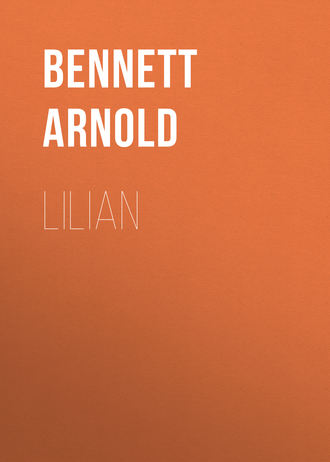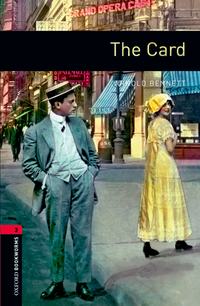 полная версия
полная версияLilian
It was during the preliminaries to the departure that she had been specially struck by his straightforwardness. He would have no wangling with passports. She must travel as herself. She could think of no acquaintance qualified to sign the application for her passport. It was Felix's suggestion that she should go to the Putney doctor who had attended her father and mother. The pair had travelled separately on the same train de luxe, for which, with Felix's money, she bought her own ticket. The cost of the ticket and the general expensiveness of the purchases which Felix insisted on her making had somewhat frightened her. He reassured her by preaching the relativity of all things. "You must alter your scale-it needs only an effort of the imagination," he had said; and explained to her his financial status. She learned that he had an independent income, and his sister another though much smaller independent income, and that the typewriting business was a diversion, though a remunerative one; also that an important cash bonus just received from an insurance policy enabled him to be profuse without straining his ordinary resources.
She had trembled at the reception office of the great hotel, but Felix, laughing at her fears, accomplished all formalities for her quite openly, and indeed the discreet incuriosity of the hotel officials fully confirmed the soundness of his attitude. Ignoring the description on the passport, he had told her to sign as "Madame," and he threw out negligently that she was his cousin. This was his sole guile. Before going upstairs he had written out a telegram and shown it to her. It was to his sister, to say that he had arrived safely and sent his love. "She has to be deceived," he murmured, "but she's got to be treated decently. It was all I could do to keep her from coming to see me off at Victoria!" He smiled. Lilian was impressed. When Lilian found that Felix's bedroom stood next to her bathroom her anxieties were renewed. Felix laughed again, and rang, for the door between the bathroom and his bedroom was locked. In a few minutes a dark and stoutish chambermaid entered with a pleasant, indulgent, comprehending gravity, and unlocked the door. "What is your name?" he asked. "Jacqueline, monsieur," she replied, and cordially accepted a twenty-franc note from him. It was all so simple, so natural, so un-English, so enheartening. In two hours they had settled down. All the embarrassing preludes to the closest intimacy had been amply achieved in London.
Lilian stretched herself voluptuously, murmured with a magnificent yawn, "Ah! How I have slept!" and, slipping out of bed, padded unshod up the room to Felix, who sat passive in the easy chair. She took the bearings of his shape in the gloom, and dropped lightly on to his knees.
"What am I sitting on?" she exclaimed, startled.
"My newspapers."
Touched by the fact that he had been waiting to read his beloved papers until she should be ready to rise, she threw her arms passionately round his neck and crushed her face into his. Daily it became clearer to her that he adored her; and yet she could scarcely believe it, because she felt so young-even childish-and so crude and insipid. She determined with a whole-souled resolve that renewed itself every hour to stop at nothing to please him.
"Do I make you happy?" she whispered almost inarticulately, her lips being buried in his cheek.
"You do."
After a moment she sprang up, seized her thin, loose, buttonless dressing-gown, and having somehow got into it, opened the window and violently pushed back the shutters. Strong sunlight rushed blazing into the room like an army into a city long besieged and at last fallen. Millions of buoyant motes were revealed, and all the minutest details of the chamber. Lilian looked out. There were the shady gardens of the hotel, the white promenade with strolling visitors in pale costumes, the calm ultramarine Mediterranean, the bandstand far to the right emitting inaudible music, the yellow casino, beyond the casino the jetty with its group of white yachts, and, distant on either side, noble and jagged mountains, some of them snow-capped. Incredible! She heard Felix moving within the room, and turned her head.
"Darling, what are you doing?"
"Ringing for your coffee."
"What time is it?"
"Haven't the least."
"But your watch?"
"Haven't got it on."
"But you're all dressed."
"Haven't put my things in my pockets."
She clasped his arm and led him silently through the bathroom into his own bedroom, and up to the night-table, the drawer of which she pulled open. All his "things" were arranged carefully therein.
"Oh! Men are funny!" she laughed.
The number and the variety of the articles they carried in their innumerable pockets!
"I will put your things in your pockets," she said, and began to do so.
"Wrong!" he would protest from time to time; but he would give no positive direction, and she had to discover the proper pocket by experiment. It was a most wonderful operation, and it deliciously illustrated the exotic, incomprehensible, exquisite curiousness of men. She was proud of having thought of it, and proud of the pleasure in his face. As she glanced at the watch her brow puckered.
"I shall be frightfully late!"
"It is impossible to be late where time does not exist."
"Is that Jacqueline with my coffee?" she said, listening, and ran back to her room, pulling him after her.
Yes, she admitted she was a perfect child, but she could not help it. While she drank the coffee he put on his eyeglasses and opened the newspapers, one English, one French. She went into the bathroom.
"Felix! Felix!" she called presently from the bathroom. "Bring me in that soft towel I've left on the chair by the writing-table."
Then she returned to the bedroom and did her abundant glossy chestnut hair, and by innumerable small stages dressed. He was reading his papers, but she knew that he was also watching her, and she loved him to watch her dress, from the first stage to the last. She was too young to have anything to conceal, and his pleasure, which he tried to mask, was so obvious. He dropped The Times and turned to the French paper.
"Felix, do you know what?"
"What?"
"I'm frightfully ashamed of not being able to speak French. If I could only speak it a quarter as well as you do."
"That's nothing. I couldn't say two words without a Frenchman knowing instantly that I wasn't French."
"But you can talk it so quickly. Couldn't I have someone in here every morning to teach me for an hour? People do. I could get up earlier."
"Certainly not," Felix replied. "If you did you'd have something to be late for. You'd bring time into existence and spoil everything. Besides, learning French is hard work. You wouldn't learn it by instinct, as you learn clothes. And you aren't here for hard work. Learn French by all means, but not in this place. London's the place for hard work. Exercise your sense of the fitness of things, my clever girl."
She did not fully understand this philosophy, but she accepted it admiringly.
"What dress would you like me to wear, darling?" She was at the wardrobe.
"That white one."
"Then I shall have to change my stockings."
"Well, the yellow one, then. It doesn't matter."
"Of course it matters," she said with earnestness, sitting down religiously, fanatically, to change her stockings. "Don't you know that I don't want anything in the world except to please you? I only wanted to learn French so you shouldn't have to be ashamed of me."
II
The Big Yacht
After lunching to music beneath a vast parasol in the hotel garden, which looked like a tented field, they were bowed away by servitors in black and white, and bowed into the hotel by servitors in blue and gold, and bowed along the central artery of the hotel by apprentice-servitors in scarlet, and bowed out of the hotel again on to the promenade by servitors in blue and gold. It was half-past two; the glorious sun was already slipping down; they had done absolutely nothing, and yet they had not wasted a moment; and on the faces of all the many-coloured servitors there was the smiling assurance that they had been admirably exerting themselves in full correctness, and had not a moment to waste if they honestly desired to pursue idleness as idleness ought to be pursued. Indeed, the winter day was too short for the truly conscientious.
"Your little fur?" exclaimed Felix, who was wearing his overcoat; he stopped.
"But, darling, I'm far too hot as it is!"
"In an hour the day will be gone," said he, and insisted on the treachery of the climate.
He frequently insisted on the treachery of the climate. If he happened to cough ever so slightly, he would say that the entire Riviera was bad for the throat and that a sore throat was the most dangerous complaint known to man. Lilian indulgently thought him fussy about her health and his own and the awful menaces of the exquisite climate; but she did not attribute his fussiness to his age; she regarded him as merely happening to be a bit fussy on certain matters. Nor did she regret the fussiness, for it gave her new occasions to please him and (in her heart) to condescend femininely towards him.
"I shan't need it-"
"Please! I'll fetch it, and I'll carry it. No! You stay there."
"But do you know where it is, Felix?"
"I know where it is." His voice had become very firm and somewhat tyrannic.
She stood on the pavement, put up her orange sunshade, and mused contentedly upon his prodigious care for her-proof of his passionate attachment. People were passing in both directions all the time on the broad digue beyond the roadway. Some strolled in complete possession of idleness; others hurried after it, with tools such as tennis rackets to help them. Nearly all, men and women, stared at her as they passed, until at length she turned round and faced the revolving door of the hotel.
"Oh! Thank you, dearest; you're spoiling me horribly. Do let me take it."
"I will not. Of course I am spoiling you. That is what you're here for. Your highest duty in life is to be spoiled. Let's go on the Mole."
They set off. A dark man, overdressed in striped flannels, nearly stood still at the sight of Lilian, gazing at her as though he had paid five francs for the right to do so.
"My goodness!" she muttered. "How they do stare here!"
"Why grudge them harmless enjoyment," Felix observed. "You're giving pleasure to every man that looks at you, and envy to most of the women. You're fulfilling a very valuable function in the world, If anyone is justified in objecting, I am, and I don't object. On the contrary, I'm as proud of the staring as if I'd created you. There's nothing to beat you on this coast, with your ingenuous English style of beauty, and half the pretty women here would sell their souls to look as innocent as you look, believe me!"
Lilian said nothing in reply. The fact was that the man simply could not open his mouth without giving her more to think about than she could manage.
At the quay they examined all the yachts, big and little, that were moored, stern on, side by side. There were three large steam yachts, and the largest of the three, with two decks and a navigating deck, all white and gold and mahogany and bunting and flowers and fluttering awnings, overpoweringly dominated the port. Felix stopped and stared at the glinting enormity.
"Is that only a yacht?" Lilian cried. "Why! It's bigger than the Channel steamer!"
"No!" said Felix, "but she's the fourth largest yacht in the world. That's the celebrated Qita. Crew of eighty odd. She came in last night for stores, and she's leaving again to-night, going to Naples. And here are the stores, you may depend." A lorry loaded with cases of wine drove up.
"But it's all like a fairy tale," said Lilian.
"Yes, it is. And so are you. You see, the point is that she's just about the finest of her kind. And so are you. She costs more than you to run, of course. A machine like that can't be run on less than a thousand pounds a week. Come along. Who's staring now?"
"A thousand pounds a week!" Lilian murmured, aghast. Her imagination resembled that of a person who, on reaching a summit which he has taken for the top of the range, sees far higher peaks beyond. And the conviction that those distant peaks were unattainable saddened her for a moment. "It's absolutely awful."
"Why awful? If you have the finest you must pay for it. A thousand a week's nothing to that fellow. Moreover, he's a British citizen, and he did splendid service for his country in the war. Among other things, he owns two of the best brands of champagne. The War Office gave him a commission and a car; and he travelled all over Europe selling his own champagne at his own price to officers' messes. After all, officers couldn't be expected to fight without the drinks they're accustomed to, could they?"
Lilian obscurely divined irony. She often wished that she could be ironical and amusing, as Felix was; but she never could. She couldn't conceive how it was done.
They reached the Mole, which was quite deserted, being off the map of correctness, and surveyed the entire scene-ships, blue water, white hotels, casino, villas, green wooded slopes all faint in the haze, and rising sharply out of the haze the lofty line of snow. In the immediate foreground, almost under their feet, was a steel collier from the north. Along the whole length of the ship carts were drawn up and cranes were creaking, and grimy ragged men hurried sweating to drop basketfuls of coal into the carts, and full carts were always departing and empty carts always coming. The activity seemed breathless, feverish and without the possibility of end-so huge was the steamer and so small were the pair-horse carts.
Two yacht's officers passed in shiny blue with gilt buttons and facings. Growled one:
"Yes, and how the hell do they expect me to keep my ship clean with this thing between me and the weather?"
"Yes," agreed the other. "How in hell do they? Why they don't make 'em unload somewhere else beats me."
Then Felix and Lilian turned seawards and watched the everlasting patience of the fishers on the rocks below.
"Better put your fur on," said Felix suddenly.
She put it on.
Returning to the quay Lilian could not keep her eyes off the superb yacht. But in a moment she bent them suddenly and quickened her pace.
"You're feeling chilly," said Felix triumphantly. "The sun's got behind the fort."
On the lower deck of the yacht, under an awning and amid easy chairs and cushions, she had seen a tall man earnestly engaged in conversation with a young and pretty girl. She thought the man was Lord Mackworth. She felt sure it was Lord Mackworth. She wanted to turn her head and make certain, but she dared not lest he should see her. She was blushing. There was nothing whatever in the brief relations between Lord Mackworth and herself to which the slightest exception could be taken by the strictest moralist. Yet she was blushing. She blushed because of the dreams she had once had concerning him. Her old, forgotten thoughts, which nobody on earth could ever have guessed, made her into a kind of criminal. It was very strange. Perhaps also she feared a little what Lord Mackworth might think of her if he saw her in that place, in those clothes, with a man much older than herself. How inexpressibly fortunate that the yacht was leaving that night! Instead of looking over her shoulder at Lord Mackworth, she looked over her shoulder at Felix, to reassure herself about her deep fondness for him and about his reliability in even the greatest crises.
"I love him," she reflected, "because he is so marvellously clever and kind and dependable and just, and because he worships me-I don't know why."
But she was devoted to him because he had picked her out of a batch and opened her eyes to the apple on the tree and made her eat it, and because she had worked and watched and suffered for him in the office, and been cast out of the office for him, and because of a funny enigmatic look in his wrinkled eyes. She would have liked him just the same if he had been cruel and undependable and had not worshipped her. And she desired ardently to be still more and more beautiful and luxurious for him, and more and more to be stared at for him, and to render him still happier and happier. She was magnificently ready to kill him with bliss.
After several hundred yards she turned round and looked at the yacht. No figures were distinguishable now on the deck. She thought captiously:
"I wonder who that doll was and what they were talking about with their heads so close together."
III
The Casino
Lilian, in a negligé, was somnolently stretched out in the easy chair in her room when Felix peeped in. He looked at her enquiringly in silence for a moment, and she gave him a hazy smile.
"Oh!" he said. "Then you won't feel like going into the Casino to-night after all?"
"Nothing to stop me," she replied, with a peculiar intonation, light and yet anxious.
"Hurrah!" exclaimed Felix very gaily, almost boyishly. "Then we'll go."
The apprehension which now for two days had been eating like a furtive cancer into her mind suddenly grew and contaminated the whole of her consciousness; she could not understand his levity, for she had not concealed from him the sinister misgiving.
"Yes!" she murmured with a sort of charming and victimized protest. "That's all very well, but-" And she stopped, and the smile expired from her face.
He shrugged his shoulders, gave a short, affectionate, humouring laugh, and said with kind superiority, utterly positive:
"What have I told you? The thing's absolutely imposs!"
And just as suddenly she was quite reassured and the apprehension vanished away. It could not exist against his perfect certitude. She lit up a new smile.
"Look here," he went on, "we'll dine in the Casino if we can. Of course, every blessed table may be booked, but I'll have a try."
A quarter of an hour later, when she had begun to dress, he returned with the exciting information that, at precisely the right instant, somebody had telephoned to countermand an inside table and he had secured it.
They arrived very late in the Casino restaurant, yet more diners came after them than had come before, so that ultimately it would have been difficult to draw a straight line between dinner and supper. The stars in the arched firmament of the vast and lofty hall challenged the stars of heaven in number and splendour, and seemed to win easily. Light fell in glittering floods on the flowered tables and on the shoulders of the women. In the centre of the floor was an oblong parquet sacred to dancing. The band, in which Englishmen and varied dagoes were mingled, sat, clothed apparently in surplices, on a daïs in a mighty alcove. The drummer and the banjoist each procured an unnatural union of light and sound by electric illumination of their instruments from within. The leader wore a battered opera hat, and at the end of a piece he would exclaim grimly and scornfully, "So that's that!" or, "We are the goods!" or some such phrase. Now and then the band overflowed into song, and the wild chants of the Marquesas or the Fiji Islands rang riotously through the correctness of the restaurant, and Lilian caught fragments of significant verse, such as:
"The rich get rich,And the poor get children,Ain't we got fun?"showing that one touch of nature makes the Southern archipelago the very sister and bride of Europe.
The primary mission of the band was to induce a general exultant gaiety; and the mission was accomplished, nobody understood how. Lilian exulted in the food, the wine, the glitter, the noise, the wise, humorous face of Felix, and the glances which assailed her on every hand. All care fell away from her. She forgot the future, and the whole of her vitality concentrated itself intensely in the moment. Most of the conversation at neighbouring tables was in English, and it was all about gambling, dancing, golf, lawn-tennis, polo, cards, racing, trains de luxe, clothes, hotels, prices, and women. Even in the incomprehensible French gabble that reached her she could distinguish words like "golf," and "bridge," and "picnic."
Then four elegant, waisted young men appeared mysteriously from nowhere and approached certain tables and bowed with an assured air, and instantly four elegant young women rose up, without being asked, and the professional couples began to display to the amateurs the true art of the dance. Lilian had never seen such dancing.
"Why are they all Spanish girls?" she innocently asked, struck by the rich, dark skin of the women.
"They're no more Spanish than you are," said Felix. "You perceive that one there. She's at our hotel, on our floor, and I've seen her as blonde as a Norwegian. The dark olive is the result of strange cosmetics, and a jolly fine result, too. Nothing finer has been invented for a century. It's so perverse. Don't you like it?"
"I think it's lovely!" she agreed with enthusiasm, also with a vague envy.
Later, when the senoritas had left their partners and resumed their interrupted meals, and the parquet was empty again, she said:
"I do really think it's awful, all this! It's so expensive, everything; and it's all for pleasure. The whole town's for pleasure." In the background she had a vision of her working life, with its discipline and cast-iron hours and wristlets and fatigue and privations and penury. The click of the typewriter, the green-shaded lamps, the Tube, the cold bedroom, the washing and sewing done in the cold bedroom! The blue working frock with its pathetic red line of clumsy embroidery!
"What about Margate?" Felix demanded quietly.
She was nonplussed.
"Oh! But that's different!"
"It is. It's not half as good. You must remember there's nothing new in all this. It's been going on in the Mediterranean for thousands of years, and it's likely to go on for thousands of years more. It's what human nature is. What are you going to do about it? Would you abolish luxury and pleasure? Not you. Do you imagine that God created the shores of the Mediterranean and this climate for anything else but this? What frightens you is the tremendous organization and concentration of the affair. Nothing else. And let me tell you that this town is the most interesting town on the coast just now. The fellow that's got the new concession for the casino is a bit of a genius. He's moulding the place into something fresh. It used to be the primmest place on earth. He discovered that the English don't want to be prim any more; he showed them to themselves. Do you suppose all these women began to come here on their own? They're pawns in his great game. He brought them; but no nice-minded person asks how, nor whether they really pay for their meals or their rooms, nor how they manage to encourage big gambling in the baccarat rooms. This fellow has put the wind up to the next town up the coast: it used to be the most corrupt town in the whole of Europe, that place used to be! And now the rival genius there is introducing large families of children and nurses there in the hope of persuading the English that they prefer to be prim and domestic after all. The fact is these two geniuses are gambling against one another for far bigger stakes than any of the baccarat maniacs. It's a battle for the command of the coast. That's what it is. You don't get the hang of it all at once; but you will in time. Let's dance."
Lilian was startled by the invitation, for they had not yet danced together. She remembered how, on that night when he first talked to her about herself, he had known that she was being deprived of an evening's dancing. They stood up as the chicken was being removed. She smiled at him with fresh admiration. He had impregnated her with new ideas; he had reassured her; he had justified her enjoyment; he was amazing; he was mad about her, in his restrained style; and now he would surprisingly dance with her.
Although they took the floor early in the dance, when only two other couples had begun to dance, it was impossible for her to be nervous within his arm. Half the room gazed at her, for she had attracted attention from the first. She knew that half the room was gazing at her, and she liked it. She guessed that half the room was saying: "Look at that fresh young creature who's with that middle-aged man-she must be really very young." And she liked it. She liked to show herself with the man who was more than old enough to be her father, worn by knowledge and experience and the corrupting of the world; to contrast her untried simplicity-the bloom of the virginal scarcely gone from it-with his grey hairs and his wrinkled, disillusioned, passive eyes. She was happy in the thought that everybody knew that she must have given herself to him, and that there was something strange, sinister, and even odious in her abandonment. He had used the word "perverse." She did not wholly understand the word, but it appealed to her, and for her it expressed her mood.









